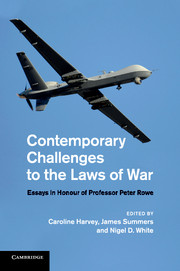82 results
11 - The Security Council and Impartiality in the Peaceful Settlement of Disputes
- from Part II - Effectiveness, Authority, and Legitimacy of the Current System of International Dispute Settlement and Possible Reforms
-
-
- Book:
- The Changing Character of International Dispute Settlement
- Published online:
- 14 December 2023
- Print publication:
- 21 December 2023, pp 317-343
-
- Chapter
- Export citation
14 - International Organizations, Disarmament and State Behaviour
-
-
- Book:
- The Cambridge Companion to International Organizations Law
- Published online:
- 31 March 2022
- Print publication:
- 07 April 2022, pp 315-335
-
- Chapter
- Export citation
Outsourcing Military and Security Functions
- Part of
-
- Journal:
- AJIL Unbound / Volume 115 / 2021
- Published online by Cambridge University Press:
- 13 September 2021, pp. 317-321
-
- Article
-
- You have access
- Open access
- HTML
- Export citation
A history of high-power laser research and development in the United Kingdom
- Part of
-
- Journal:
- High Power Laser Science and Engineering / Volume 9 / 2021
- Published online by Cambridge University Press:
- 27 April 2021, e18
-
- Article
-
- You have access
- Open access
- HTML
- Export citation
11 - The Security Council, Peace-Making and Peace Settlement
- from Part III - Key Actors and the Role of International Law
-
-
- Book:
- International Law and Peace Settlements
- Published online:
- 14 January 2021
- Print publication:
- 04 February 2021, pp 237-263
-
- Chapter
- Export citation
Guest Editorial: Business, Human Rights and Security
-
- Journal:
- Business and Human Rights Journal / Volume 4 / Issue 1 / January 2019
- Published online by Cambridge University Press:
- 02 April 2019, pp. 1-5
-
- Article
-
- You have access
- HTML
- Export citation
6 - Treaties as ‘Living Instruments’
- from Part I - Conceptual Perspectives
-
-
- Book:
- Conceptual and Contextual Perspectives on the Modern Law of Treaties
- Published online:
- 19 October 2018
- Print publication:
- 25 October 2018, pp 136-171
-
- Chapter
- Export citation
Ending the US Embargo of Cuba: International Law in Dispute
-
- Journal:
- Journal of Latin American Studies / Volume 51 / Issue 1 / February 2019
- Published online by Cambridge University Press:
- 13 August 2018, pp. 163-186
- Print publication:
- February 2019
-
- Article
- Export citation
3 - Settling Disputes
-
-
- Book:
- The Law of International Lawyers
- Published online:
- 25 May 2017
- Print publication:
- 30 March 2017, pp 61-92
-
- Chapter
- Export citation
5 - Security Council mandates and the use of lethal force by peacekeepers: what place for the laws of war?
- from Part I - Structural and systemic aspects of the laws of war
-
-
- Book:
- Contemporary Challenges to the Laws of War
- Published online:
- 05 November 2014
- Print publication:
- 16 October 2014, pp 95-116
-
- Chapter
- Export citation
Contents
-
- Book:
- Contemporary Challenges to the Laws of War
- Published online:
- 05 November 2014
- Print publication:
- 16 October 2014, pp v-vi
-
- Chapter
- Export citation
Part III - Responsibility and accountability
-
- Book:
- Contemporary Challenges to the Laws of War
- Published online:
- 05 November 2014
- Print publication:
- 16 October 2014, pp 283-360
-
- Chapter
- Export citation
Contemporary Challenges to the Laws of War - Half title page
-
- Book:
- Contemporary Challenges to the Laws of War
- Published online:
- 05 November 2014
- Print publication:
- 16 October 2014, pp i-ii
-
- Chapter
- Export citation

Contemporary Challenges to the Laws of War
- Essays in Honour of Professor Peter Rowe
-
- Published online:
- 05 November 2014
- Print publication:
- 16 October 2014
Part II - Effective protection?
-
- Book:
- Contemporary Challenges to the Laws of War
- Published online:
- 05 November 2014
- Print publication:
- 16 October 2014, pp 147-282
-
- Chapter
- Export citation
Contributors
-
-
- Book:
- Contemporary Challenges to the Laws of War
- Published online:
- 05 November 2014
- Print publication:
- 16 October 2014, pp vii-xiv
-
- Chapter
- Export citation
Copyright page
-
- Book:
- Contemporary Challenges to the Laws of War
- Published online:
- 05 November 2014
- Print publication:
- 16 October 2014, pp iv-iv
-
- Chapter
- Export citation
Part I - Structural and systemic aspects of the laws of war
-
- Book:
- Contemporary Challenges to the Laws of War
- Published online:
- 05 November 2014
- Print publication:
- 16 October 2014, pp 49-146
-
- Chapter
- Export citation
Preface
-
- Book:
- Contemporary Challenges to the Laws of War
- Published online:
- 05 November 2014
- Print publication:
- 16 October 2014, pp xix-xx
-
- Chapter
- Export citation
Contemporary Challenges to the Laws of War - Title page
-
-
- Book:
- Contemporary Challenges to the Laws of War
- Published online:
- 05 November 2014
- Print publication:
- 16 October 2014, pp iii-iii
-
- Chapter
- Export citation



